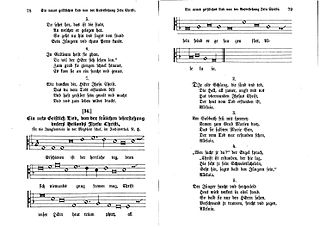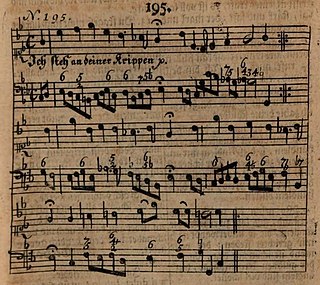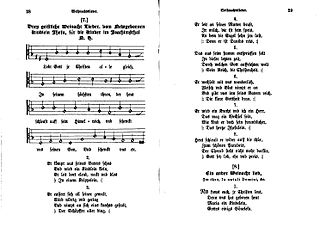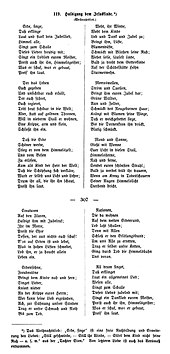
"Gott sei gelobet und gebenedeiet" is a Lutheran hymn of 1524 with words written by Martin Luther who used an older first stanza and melody. It is a song of thanks after communion. Luther's version in three stanzas was printed in the Erfurt Enchiridion of 1524 and in Johann Walter's choral hymnal Eyn geystlich Gesangk Buchleyn the same year. Today, the song appears in German hymnals, including both the Protestant Evangelisches Gesangbuch, and in a different version in the Catholic Gotteslob.

"Erschienen ist der herrlich Tag" is a German Easter hymn, with text and tune written by Nikolaus Herman and published in 1561. It has inspired musical settings by composers from the 17th to the 20th century. It appears in several hymnals, including the German Protestant hymnal Evangelisches Gesangbuch. Other hymns, especially Easter hymns, in both German and English, are sung to the same melody.
"Den Herren will ich loben" is a Christian hymn by Maria Luise Thurmair, based on the Magnificat and set to a 1613 melody by Melchior Teschner, which was used for "Valet will ich dir geben". The hymn in three stanzas of eight lines was first written in 1954, and revised in 1971. It appeared in the Catholic hymnal Gotteslob in 1975, and in the current Gotteslob, but also in a German Protestant hymnal. A general song of praise, it has been set to music several times.

"Ich steh an deiner Krippen hier" is a German Christmas hymn, with lyrics by Paul Gerhardt which were first published in 1653. It was then sung with an older melody by Martin Luther, but a melody which was likely created by Johann Sebastian Bach for Schemellis Gesangbuch of 1736 is now part of current Protestant and Catholic hymnals.

"Lobt Gott, ihr Christen alle gleich" is a German Christmas carol with lyrics and melody by Nikolaus Herman. It is part of Protestant and Catholic hymnals, has inspired musical settings, and has been translated. The title is also known as "Lobt Gott, ihr Christen allzugleich".
"Nun singe Lob, du Christenheit" is a Christian hymn by Georg Thurmair, set to a 1653 melody by Johann Crüger. It is a song of praise, focused on unity within the church. The hymn in five stanzas of for lines each was written in 1964, revised in 1967. It is part of the current Catholic hymnal Gotteslob as GL 487, in the section "Kirche – Ökumene".

"Im Frieden dein, o Herre mein" is a three-stanza German Christian communion hymn. In 1527 the early Reformer Johann Englisch wrote two stanzas as a rhyming close paraphase of the Nunc dimittis, or Canticle of Simeon. The hymn is sung to a melody by Wolfgang Dachstein, written before 1530. Friedrich Spitta revised the lyrics in 1898 and added a third stanza. His revision transformed Englisch's prayer of an individual with a focus on a peaceful death to a communal one more about peaceful life in unity.

"Gott ist gegenwärtig" is a Christian hymn in German by the Reformed writer Gerhard Tersteegen, published in 1729, based on a 1680 melody by Joachim Neander. The hymn, with the melody simplified, is part of the Protestant hymnal Evangelisches Gesangbuch as EG 165 and the 2013 Catholic hymnal Gotteslob as GL 387. Seven of its eight stanzas are part of the Mennonite hymnal as No. 1. The hymn is regarded as an expression of Christian mysticism. It was translated to English in various versions.

"Dein Lob, Herr, ruft der Himmel aus" is a German Catholic hymn. Adolf Lohmann adapted a 1659 hymn by the Jesuit astronomer Albert Curtz, who paraphrased Psalm 19. The melody appeared in Augsburg in 1669. It was No. 1 in the 1938 hymnal Kirchenlied and is part of the German Catholic hymnal Gotteslob as GL 381.
"Meine Seele, dank und singe" is a German Catholic hymn. A first version appeared in Dillingen in 1807, to a 1741 melody from Cologne. Some hymnals have the beginning "Meine Seele, auf und singe". It is part of regional sections of the German Catholic hymnal Gotteslob of 2013. The diocese of Trier has three stanzas as GL 802. The Diocese of Limburg has the first and the third stanza as GL 743 as an Advent song.
"Nun liebe Seel, nun ist es Zeit", alternatively written "Nun, liebe Seel, nun ist es Zeit", is a Lutheran hymn for Epiphany, in five stanzas of six lines each, by Georg Weissel. It was first printed in 1642, set as a motet by Johannes Eccard. A version with an additional stanza is attributed to Johann Christoph Arnschwanger.
"Singt dem Herrn ein neues Lied" is a Christian hymn in German. It was written by Georg Alfred Kempf, a Protestant pastor in Alsace, in 1941. With a 1956 melody by Adolf Lohmann, it is part of the common German Catholic hymnal Gotteslob (2013).
"Erfreue dich, Himmel, erfreue dich, Erde" is a Christian hymn in German. The current hymn, part of modern hymnals and song books, was written by Maria Luise Thurmair in 1963 as a Psalmlied based on Psalm 148 which deals with praise of God from his creatures. She wrote it using and expanding a short Christmas carol from the 17th century. She retained the first stanza completely and used its second half as a refrain. She also retained the old melody.
"Wo Menschen sich vergessen" is a Christian hymn in German, with text written in 1989 by Thomas Laubach and with music by Christoph Lehmann. The hymn of the genre Neues Geistliches Lied (NGL) is also known by the beginning of the refrain, "Da berühren sich Himmel und Erde". It appears in regional sections of the 2013 hymnal Gotteslob, and in other songbooks.
"Nun lobet Gott im hohen Thron" is a Christian hymn in German, published in 1603. Caspar Ulenberg wrote it in 1582, based on Psalm 117, and modified a 1542 melody by Guillaume Franc. It is part of German hymnals, including the German Catholic hymnal Gotteslob, which has it as GL 393 in the section "Leben in Gott – Lob, Dank und Anbetung". It is also part of other hymnals and songbooks.
"Nun saget Dank und lobt den Herren" is a Christian hymn in German, paraphrasing Psalm 118. The German text was originally written by Ambrosius Lobwasser in the 16th century as a translation, meant to match the music from the French Genevan Psalter. It was rewritten and shortened in the 20th century by Peter Enderlin to be used in a hymnal of the Swiss Reformed Church. The song is included in German hymnals of various denominations.
"Ein Danklied sei dem Herrn" is a Christian hymn with German text written by Guido Maria Dreves in 1886, and a melody written by Josef Venantius von Wöss in 1928. It is a song of thanks and praise of God who protects the people he created. The song appeared as part of the Catholic Gotteslob.
"Ich lobe meinen Gott, der aus der Tiefe mich holt" is a 1979 Christian hymn with words in German by Hans-Jürgen Netz and a melody by Christoph Lehmann. This Neues Geistliches Lied song has appeared in the German Protestant and Catholic hymnals. It is a preferred song for conventions such as Kirchentag.
"Ich lobe meinen Gott von ganzem Herzen" is a Christian hymn in German, with a first stanza by Gitta Leuschner, written in 1980, and two more stanzas that Günter Balders added in 2002. The text is based on Psalm 9. The original song came from France and was a rather close paraphrase of the psalm, to a melody composed by Claude Fraysse in 1976. The song of the genre Neues Geistliches Lied (NGL) has appeared in the German Protestant and Catholic hymnals and songbooks, especially collections for children.
"Danket, danket dem Herrn" is a Christian hymn in German. The short text is taken from psalms. The music is traditional, from the 18th century. It is a round, often used for grace after meals, but also used for other occasions of thanksgiving. The song is included in German Protestant and Catholic hymnals and many songbooks, and is considered to be among the most widespread rounds in German.









